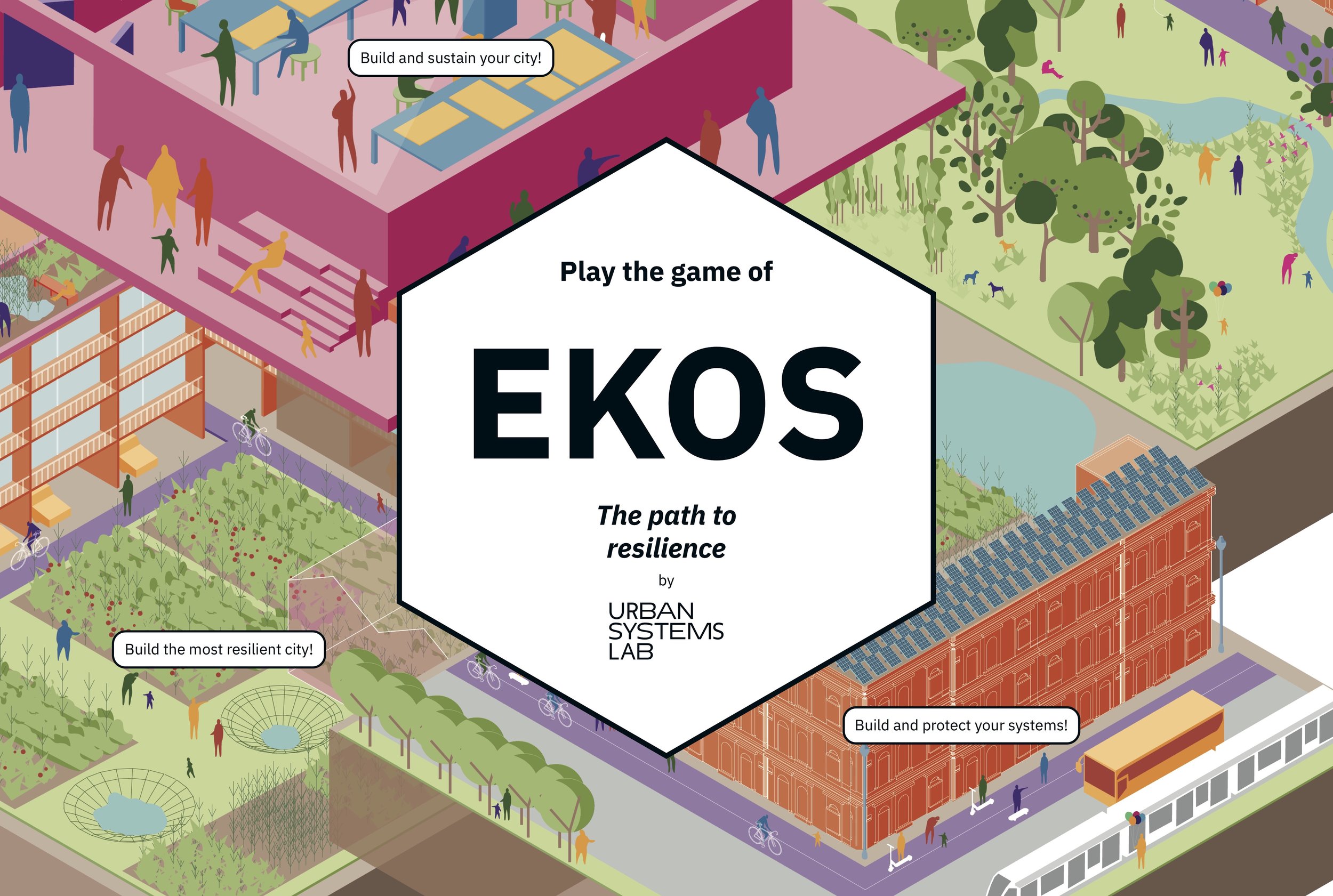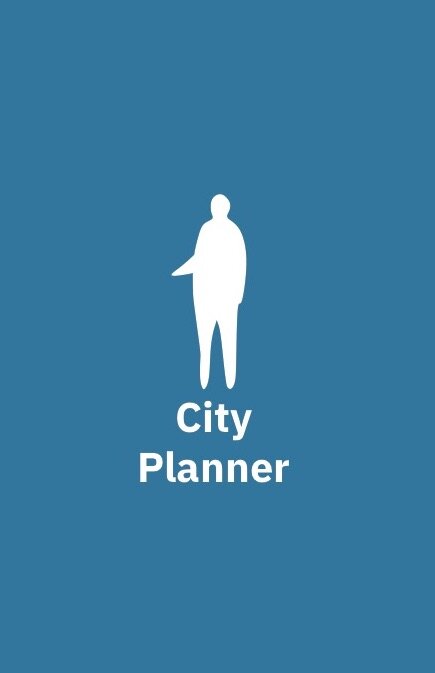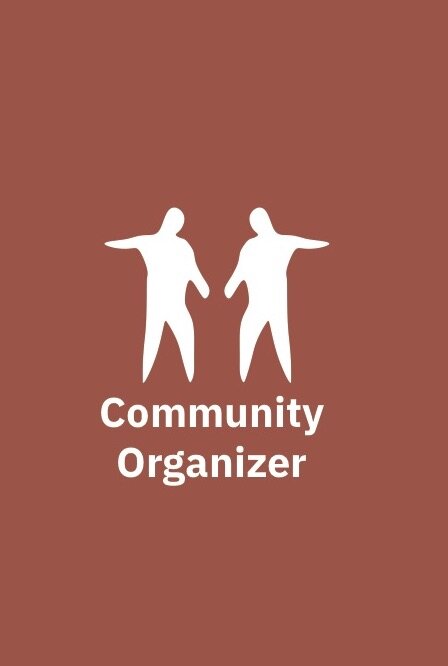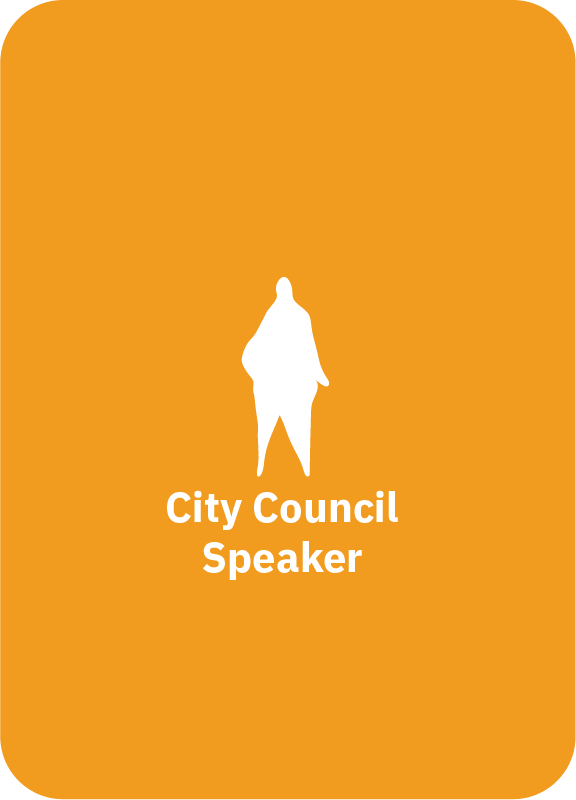If you have any issues with ordering, or if the Game Crafter’s version is sold out, please contact us! Copies are available
Introduction
It is the near future in the City of Ekos. The planet is rapidly urbanizing, placing tremendous pressure on cities and urban areas to provide good living conditions for the majority of humanity. A group of 6 community members -- a City Council Speaker, City Planner, Community Organizer, Ecologist, Designer, and Modeler -- must come together to design and build a network of resilient systems to envision a more equitable and sustainable Ekos in the face of climate change and other challenges. As one of these players, it is your mission to use resources wisely, collaborate with the other community members, balance the needs of the city with your personal vision, and improve the adaptive capacity of your systems against extreme events like heat waves, floods, power outages and pandemics.
During the game of Ekos, players alternate between building Social, Ecological, and Technological Systems (SETS), and responding to a diverse range of Events. Working cooperatively to complete challenges earns you Ekos points. The game continues until one player earns enough Ekos points to win!
Ekos is the perfect game to engage your students, to play with friends or family, and to inspire conversation with your community about how cities can understand the interactions among social, ecological, and technological dimensions of cities to build resilience, address inequities, and adapt to climate change and other hazards.
How to Play
Objective
The objective of Ekos is to be the first player to earn 15 Ekos points. Refer to the Actor Cards to learn more about your Actor Mission, by accomplishing it you get +5 bonus points!
* For classroom environments, we recommend having teams of 6 students play for 6 rounds (1 - 1.5 hours). The student with the most points at the end of the 6 rounds wins.
Step 1: Setting Up the Game
Sit in a circle with the Game Board in the middle. Place the Event cards in the corresponding place on the board and arrange the System, and Adaptation Cards around the board where everyone can access them. Flip the top three Adaptation Cards and arrange them in a line next to the pile.
Everyone chooses an Actor Card randomly, take note of your Actor’s ability and mission. Draw six (6) Resource chips randomly from the corresponding actor color to start.
Roll the die to determine who will go first. The player who rolls the highest number goes first, followed by the person to there left.
For Beginners: To get started, practice building a system. A system is a certain combination of six (6) chips arranged in a circle on the board. Refer to the System Key to see what chips make up each system. A social system must include 3 water and 3 energy resource chips. An ecological system must include 3 infrastructure and 3 water resource chips. A technological system must include 3 energy and 3 infrastructure resource chips. Share your system with the other players by adding to a system already on the board. Intersecting systems is allowed.
Now you are ready to play!
Ekos Game Setup
Step 2: Playing Ekos
To begin playing, start a round of the game. A round consists of each player taking a turn.
During the first round, each player must roll the die (twice) and collect the corresponding four (4) Resource chips. Everyone must build at least one (1) complete system on the board (during their first turn). In subsequent rounds, when choosing to place Resource chips on the board, they don’t need to be used solely for completing a system.
During all subsequent rounds, whenever it is a player’s turn, that player may choose to roll the die (twice) and collect the corresponding four (4) Resource chips OR draw one (1) Event Card. They could be “beneficial”, “damaging” or “challenge” Event Cards. Detailed instructions are written on each card. Points are gained through “positive” and “challenge” Event Cards, and also by completing your Actor mission.
The game continues until one player achieves 15 points. Once a player has achieved this, they must announce it and the current round must be played to completion. If the winning player does not lose any points or systems for the duration of the round, they win the game! If they do lose points or systems, that player is out of the game and the game continues.
If an actor accomplishes their mission, they get +5 bonus points!
On your turn you can:
Option 1: Roll the die twice and collect four (4) Resource chips. Refer to the Resource Key located on the board.
Option 2: Draw 1 Event Card and follow the instructions. You can get points (Beneficial Events, Challenge Events) or loose points (Damaging Events) through Event Cards
Step 3: Wrapping Up the Game
In order to win, each Actor must earn at least 15 Ekos Points. Remember, they must announce this to all players, and the round must be played until completion. If the winning player does not lose any points or systems for the duration of the round, they win the game!
If no player earns all 15 points, the player with the most points wins.
Game in Detail
Building Systems
Refer to the System Key on page 12 to see what chips make up each system. Systems can intersect each other.
Every time you build a system, draw one corresponding System Card.
There’s no limit to the amount of chips you can play during your turn, but remember to use them wisely.
You can place chips on the board that do not result in building a system.
You may save resources by building off a system that is already on the board. However, whichever player has the majority of the chips in the system is the player that gets the System card for that system. It is possible (and encouraged!) for two, three or even six players to share a system if they all have an equal number of chips in the system. In this case, all players sharing the system would each get a System Card.
Example Systems Cards
Understanding Resource and Event Cards
To get resources (for building systems) you can choose to roll the die twice during your turn and collect the corresponding four (4) Resource Chips. Take a look at the Resource Key printed on the board.
Completing the challenges on Event Cards earns you Ekos points.
You can still build systems during your turn if you choose to draw an Event Card.
Not every Event Card contains a challenge. Some may damage your systems or require you to give
up resources. Different symbols on the Event Cards distinguish Challenge, Beneficial, and Damaging Events.If you are unable to complete the challenge on an Event Card, you lose your next turn. You are out of the game if you fail to complete three challenges.
Resource Cards
Event Cards
Sharing Systems
You may save resources by building off a system that is already on the board. However, whichever player has the majority of the chips in the system is the player that gets the corresponding System card. It is possible (and encouraged!) for two, three or even six players to share a system. If they have an equal number of chips in the system, all players sharing the system would each get a System Card. If any chips are removed from a system, everyone sharing the system loose the corresponding System Card.
Event Cards
Read all Event Cards thoroughly and follow the instructions. There is always risk involved when drawing an Event Card. Event Cards may provide opportunities for players to earn points, or they may damage systems. The best way to prepare for a damaging event is to have extra resources available, and gain Adaptations.
Challenge-based Event Cards focus on real-world problems related to the Resilience, Equity, or Sustainability of cities. Challenges may include building specific systems, gaining adaptations, or collaborating with other players.
If chips are ever removed from a system, you and anyone sharing the system lose the corresponding System Card.
If a player is unable to complete the challenge on an Event Card, they lose their next turn. A player is out of the game if they fail to complete a total of three challenges
Gaining Adaptations
Adaptations protect your systems from the effects of some Events and also earn you points. The Adaptive Capacity of systems (look at your system cards) is required in order to obtain Adaptations.
Players can pool their systems’ Adaptive Capacity to get Adaptations, but they cannot share them. There should always be three Adaptation cards facing up next to the Adaptation Card deck from which you must pick when obtaining one. After you collect the card, replace it with one from the deck
Adaptations may only be obtained when prompted by an Event Card. After obtaining and adaptation, keep the card in front of you. Adaptations protect against Events that require you to remove chips off the board or freeze your system’s capacity. If you lose a system with an Adaptation applied to it, you lose the Adaptation as well.
All Adaptations cost four (4) Adaptive Capacities. Each system has either one (1) or two (2) Adaptive Capacity that can be added up to get Adaptations. Refer to the System Card to see how much Adaptive Capacity a system has.
To use a system’s Adaptive Capacity, flip the System Card over so it is face down. Leave the System Card flipped over for one round. Adaptive Capacity recharges every round.
Adaptation Cards
Trading
At any point during your turn you may trade Resource Chips with other players and/or the Ekos Coop (the pile of chips not in play). When trading with the coop, you must trade three (3) of one type of Resource Chip for one (1) of a different type. When trading with other players, you can negotiate in each case. Use the Ekos Coop to facilitate equal exchange while keeping the same color of chips.
Trading Systems
Game Board
There are trade-offs associated with the different zones on the board (Coastline, Urban Core, and Green Spaces). Event Cards may benefit or damage systems that are built in certain zones. For example, a Coastal Flood will only affect systems in the coastal zones.
If any part of a system is within a zone on the board, that system is counted within that zone. If any system overlaps with more than one zone, the system is subject to Events related to both zones. It is possible for a system to be counted within all three zones.
Different zones on the board may be impacted by Events in different ways.
Actor Cards
CITY COUNCIL SPEAKER: The City Council Speaker carries out the Ekos City Council’s legislative and policy objectives. The Speaker also consults with the City’s Attorney, who advocates and resolves disputes, reviews and develops contracts, and provides legal counsel. Once per game, the City Speaker may draw three adaptation cards and choose one to use with their systems. The remaining cards are discarded. To win, the Speaker must build at minimum four social and two technological systems.
COMMUNITY ORGANIZER: The Community Organizer is involved in a number of coalition building efforts, and provides a forum for Ekos community members to share their voice. Twice per game the Community Organizer may draw 3 Resource Cards on their turn. To win, the Community Organizer must build at minimum eight social systems
CITY PLANNER: The City Planner is primarily responsible for managing and coordinating citywide development and infrastructure projects. The City Planner works with the Speaker, Community Organizer and urban planners to determine future plans for the City of Ekos. Once per game, the City Planner may look at the top four Resource cards, pick two, and put the discarded cards on the bottom of the deck. To win, the City Planner must build at minimum six technological systems.
MODELER: The Modeler uses a variety of tools such as Geographic Information Systems (GIS) to share relevant data and develop possible scenarios for future planning in the City of Ekos. Twice per game, the Modeler may look at the top two Event cards, pick one, and put the discarded card on the bottom of the deck. To win, the Modeler must build at minimum three ecological systems and three technological systems.
ECOLOGIST: The Ecologist’s role is to help monitor, research, and advocate for the City of Ekos’ ecological systems - including green and blue spaces and green infrastructure. Twice per game, the Ecologist may look at the top two Event cards, pick one, and put the discarded card on the bottom of the deck. To win, the Ecologist must build at minimum six ecological systems
DESIGNER: The Designer plays a key role in the City of Ekos’ planning department, assisting the City Planner in developing new designs, maps and visualizations. Once per game, the Designer may look at the top four Resource cards, pick the two, and put the discarded cards on the bottom of the deck. To win, the Designer must build at minimum five social systems.
Frequently Asked Questions (FAQ)
How do I win?
To win, you must earn 15 Ekos Points. Remember that if you complete the Actor’s Mission, you get +5 bonus points!
Can you share systems?
Sharing systems is a smart way to save resources and collaborate with other players. But remember, whichever player has the majority of the chips in the system is the player that gets the System card for that system. If all players have an equal number of chips in a system, each player gets a system card.
If I draw an event card can I still build systems during my turn?
Yes, but you cannot obtain additional resource chips (you can’t roll the die).
How do I know the difference between Event Card types, ones that affect everyone or just specific systems?
Event cards include symbols and labels which indicate if they are a Sustainability, Resilience or Equity Challenge, or are Events that are beneficial or damaging to more than one player or system.
What do adaptations do, and how do I get them?
Adaptations protect your systems from the effects of some Events and also earn you points. The Adaptive Capacity of systems is required in order to obtain Adaptations. To use a system’s Adaptive Capacity, flip the System Card over so it is face down.
Can I place chips on the board that do not result in a completed system?
Yes.
How do I gain adaptive capacity, and what is it?
Adaptive Capacity is a system’s ability to change and withstand Events. Each system has either one (1) or two (2) Adaptive Capacity that can be added up to get Adaptations. Refer to the System Card to see how much Adaptive Capacity a system has.
Who goes first?
All players will roll the dice to determine who goes first. The player that rolls the highest number will start. If 2 or more players tie, continue rolling the dice until someone rolls a higher number.
How are my systems affected if they are located in more than one geographic zone?
If you build a system in more than one geographic zone, the system will be equally impacted by any damaging event or event challenge specific to that region.
What is a systems card?
A system is a combination of six resource chips arranged in a circle on the board. Every time you build a system, you earn one System Card.
How do I build a system?
To build a system you need 6 resource chips arranged in a circle on an available space on the board.
What resource chips do I need to build certain systems?
A social system must include 3 water and 3 energy resource chips. An ecological system must include 3 infrastructure and 3 water resource chips. A technological system must include 3 energy and 3 infrastructure resource chips.
Glossary
Sustainability: Sustainability is the ability of a system to endure and sustain resources over time. Some Event cards will require you to complete a Sustainability Challenge.
Resilience: Resilience is the ability of a system to withstand and recover from stressors or extreme events. Some Event cards will require you to complete a Resilience Challenge.
Equity: Equity has many meanings and histories, but is often discussed as the fair distribution of resources and wealth primarily in response to forms of structural racism and classism. In Ekos, equity is a critical component of systems building, resource distribution, and collaboration amongst actors.
Ekos Points: Points a player can gain when completing an Event Challenge.
Resource Chips: Water, energy and infrastructure resources which are needed to build systems in the City of Ekos.
Adaptations: Adaptations encompass a wide range of social, ecological and technological solutions to not only mitigate the impacts of climate change and extreme weather, but also aim to make systems more resilient and adaptive to ongoing hazards
and threats. In Ekos, adaptations can protect your system from some damaging events. Some Event Challenges allow a player the opportunity to gain Adaptations by adding up the Adaptive Capacity of their systems.
System cards: A system is a combination of six resource chips arranged in a circle on the board. Everytime you build a system, you earn one System Card.
Actors: Players in the game of Ekos. They include a Modeler, Designer, Ecologist, City Planner, City Council Speaker, and Community organizer.
Events: Each round players have the opportunity to draw an Event card which will describe an event that happens in the City of Ekos. Follow the instructions and actions outlined in each Event Card. Roll the dice to determine the required action. If any player is unable to complete an action 3 times, they lose the game for their actor.
About Ekos
Ryann Abunuwara
Claudia Tomateo
Chris Kennedy
Timon McPhearson
Ekos: The Path to Resilience is a multi-player game that challenges a group of 6 community members - a City Council Speaker, City Planner, Community Organizer, Ecologist, Designer, and Modeler -- to come together and envision a more equitable and sustainable Ekos in the face of climate change and other challenges. Build a network of resilient systems, use resources wisely, and collaborate with the other community members to improve the adaptive capacity of your systems against extreme events.
About Game Dynamics
The challenge was to translate complex ideas like Sustainability, Resilience, and Equity into achievable tasks while running the risk of oversimplification. Questions that drove the design process were sometimes specific and tangible; What are the game resources and how do you get them? And other times they required a more conceptual discussion; What does it mean for a city to be Resilient but not Equitable? or Can one person win without everyone else winning?
After many hours of testing and a dozen iterations, the final product is a nuanced game that provides lessons ranging from specific climate-related concepts, to general life lessons, such as how to work with people who may have different goals and objectives than your own. It has been a great experience to play the different versions of Ekos throughout the design process, and to navigate across its emerging (unintentionally designed) dynamics.
“The challenge was to translate complex ideas like Sustainability, Resilience, and Equity into achievable tasks.”
Learn more about how Ekos was developed by watching the video above!
Acknowledgments
Ekos: The Path to Resilience was developed by the Urban Systems Lab, an interdisciplinary research, design and practice space founded by Timon McPhearson that provides insight into developing more equitable, resilient, and sustainable cities. The goal of Ekos is to create a playful platform to discuss and learn about issues of urban resilience, climate governance and community-based codesign. Through game play and conversation, Ekos provides a unique forum for individuals and communities to better understand the complexity of city planning and decision making in a time of climate crisis. The event cards featured in the game draw from real-world occurrences and extreme events experienced by frontline communities and urban dwellers around the world. Similarly, the adaptations and social-ecological-technological systems (SETS) conceptual framework used to address these events and challenges are increasingly approaches used by decision makers in cities globally. We hope that Ekos will offer a starting point for continued conversation and discussion on how urban resilience can be used as a lens to inform the future of cities, especially in ways that benefit those most at risk.
Game concept developed by Ryann Abunuwara, Claudia Tomateo and Chris Kennedy. Graphic design by Claudia Tomateo. Content for the game informed by the Urban Resilience to Extreme-related Weather Events Sustainability Research Network (URExSRN) and the Converging Social, Ecological, and Technological Infrastructure Systems (SETS) for Urban Resilience project with support provided by the National Science Foundation (Grants No. 1934933 and 1444755).
All Rights Reserved © 2021, Urban Systems Lab























